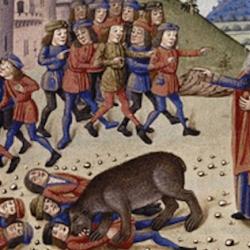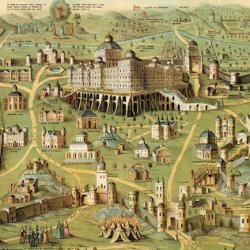INTRODUCTION
Elisha has been introduced earlier as Elijah?s successor (1 Kings 19), one of Yahweh?s instruments of judgment against the house of Omri. As Joshua succeeded Moses, and as the Spirit working with the apostles succeeded Jesus, so Elisha carries on the work of Elijah.
THE TEXT
?And it came to pass, when the Lord was about to take up Elijah into heaven by a whirlwind, that Elijah went with Elisha to Gilgal . . . .?E(2 Kings 2:1-25).
STRUCTURE AND TYPOLOGY
Chapter 2 stands outside the chronicled history of the kings of Israel. Ahaziah?s reign is ended in 2 Kings 1:18, and the account of Jehoram?s reign begins in 3:1. This chapter is structured by a neat chiasm, indicated by changes of location:
1. Gilgal, vv. 1-2
2. Bethel, vv. 3-4
3. Jericho, vv. 5-6
4. Cross Jordan, vv. 7-8 (leave sons of prophets)
5. Ascent of Elijah, vv. 9-12a
4. Elisha back across, vv. 12b-18 (return to sons of prophets)
3. Jericho, vv. 19-22
2. Bethel, vv. 23-24
1. Elisha to Samaria, v. 25
At the center of the passage is the actual succession from Elijah to Elisha. The latter half of the passage shows that Elisha has become a new Elijah. The structure underscores what the sons of the prophets recognize: ?the spirit of Elijah rests on Elisha?E(2:15).
Throughout the stories of Elijah, he has been presented as a new Moses. Ahab is Pharaoh, and now that Ahab?s son has died (Passover), Elijah and Elisha leave the land (Exodus), Elijah departs and Elisha returns to carry on a conquest, starting at Jericho! The departure and return of the two prophets points ahead toward the departure and return of Israel in the exile; in both cases, two go out and one returns.
TAKING AWAY YOUR HEAD
Elijah takes an odd route out of the land. Gilgal is close to the Jordan (cf. Joshua 4:19-24), but from there Elijah travels some 15 miles west to Bethel and then back to the Jericho, near the Jordan. Gilgal and Jericho are associated with Israel?s entry into the land, and this suggests that Elijah?s departure is a reversal of the original conquest (in preparation for a new conquest). At Bethel and Jericho, the two prophets meet groups called ?sons of the prophets?E(vv. 3, 5). Through Elijah?s ministry (who is the ?father?Eof the other prophets, v. 12), Yahweh has raised up faithful communities in the Northern Kingdom, a ?renewal church?Emovement within the mainline Church of the Golden Calf. And the sons of the prophets have established themselves in the centers of Israel?s idolatry ?EBethel (cf. 1 Kings 12) and Jericho (cf. 1 Kings 16).
Elijah and Elisha form an inseparable pair as they make a final itinerary around the country. Elisha refuses to leave, and by following in his master?s footsteps he eventually becomes like his master. In verses 3 and 5, the sons of prophets inform Elisha that ?Yahweh will take your master from your head today.?E As Elisha?s head, Elijah enters heaven, while Elisha continues the work of his master in Israel. The references to the ?head?Ealso link chiastically to the mockery of the young men of Bethel (vv. 23-25).
Elijah and Elisha leave the Northern Kingdom, which has become an Egypt, in an exodus through the Jordan. While Moses used a staff to divide the waters (Exodus 14:16), Elijah uses a folded mantle. Normally, of course, Elijah wore this mantle, which symbolized that he was a human ?staff,?Ean incarnate ?rod of judgment.?E Elisha asks for a ?double portion?Eof Elijah?s spirit, the portion of the firstborn (Deuteronomy 21:17). He becomes the preeminent ?son of the prophet.?EHe is also asking for twice as much of Elijah?s spirit; according to Jewish tradition, this is symbolized by the fact that Elisha does 16 miracles while Elijah did only 8. Jesus likewise promised his disciples that they would do ?greater things?Ewhen the Spirit comes. Elisha wears Elijah?s mantle as a sign that he bears his spirit.
Yahweh?s glory-chariot comes down to take Elijah up, like Moses, into the glory of Yahweh. Elisha calls Elijah his ?father?Eand also calls him (in the Hebrew text) the ?chariot of Israel?E(v. 12). Elijah himself has been the chariot of Yahweh, the prophet who bore God?s presence. Elisha responds by tearing his robes, a sign of mourning and a symbol of the division of the ?one flesh?Eunion of Elijah and Elisha. It is also possible that Elisha shaved his head in mourning; he lost his ?hairy head?E(Elijah) but also his ?head of hair.?E The search for Elijah reinforces that he is a Moses figure (vv. 15-18), for no one knows where Moses was buried (Deuteronomy 34:6). The fifty sons of the prophets correspond to the fifty men in chapter 1, but this fifty is searching for an Elijah who has ?gone up?Eand will not ?come down.?E
IN THE SPIRIT OF ELIJAH
Elisha returns to the land bearing the spirit of Elijah. He divides the waters with his mantle, as Elijah had done (v. 14). And he returns to the land with a spirit of healing and destruction. He is the ?Joshua?Eof the story, carrying on a conquest. But it is a different sort of conquest. Instead of destroying Jericho, he heals the waters and the land (vv. 19-22). The land is ?unfruitful?Eor ?barren,?Ecausing ?miscarriages?Eor ?abortions?E(v. 19). Elisha uses salt, perhaps symbolic of seed, to heal the land and cause it to become fruitful.
The story of Elisha?s actions at Bethel is one of the most controversial passages in Scripture. How could Elisha kill 42 children for making fun of him? This is not what the story says. The word for ?boy?Emeans ?young man,?Eand sometimes means ?subordinate.?E Further, remember that Bethel is the site of Jeroboam?s golden calf shrine. These are not children, but ?Levites?Eof the idolatrous shrine, mocking Elisha because his ?hairy head?Ehas been taken from him. Elisha?s curse is an act of warfare, a Joshua-like attack on an idolatrous shrine. Yet, the story does emphasize the extreme dangers of making fun of bald people.















